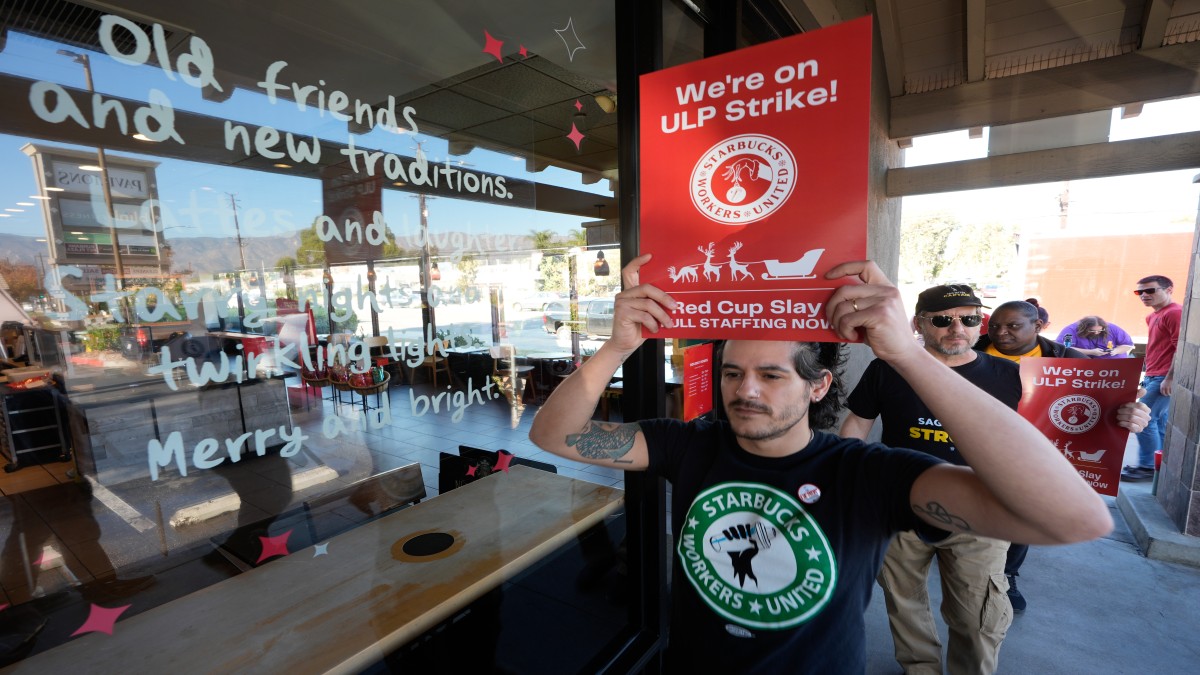Workers at Starbucks stores began a five-day strike on Friday (December 20) over a disagreement about pay and working conditions in the United States.
Starbucks Workers United – a union representing more than 10,000 baristas, initiated the strike that closed at least 59 stores as of Monday.
Starbucks says the strike has not significantly affected its operations.
Here’s a look at the demands of the union.
The strike
The strike, which began on Friday in Los Angeles, Chicago, and Starbucks’ hometown of Seattle, spread Monday to stores in Boston, Dallas and Portland, Ore.
Workers in New York, Denver, Pittsburgh and other cities had also joined the strike over the weekend.
By Monday, at least 59 Starbucks locations were reported to be closed.
The strike comes during the Christmas holiday, which is one of Starbucks’ busiest seasons.
However, the company said on Monday it has had “no significant impact” to its store operations.
Starbucks runs more than 16,000 stores in the US.
“We respect our partners’ right to engage in lawful strike activity, and we appreciate the thousands of partners across the country who are continuing to support each other and deliver the Starbucks experience for our customers,” the company said in a statement.
Demands of Starbucks Workers United
The primary issue is the increase in pay.
Starbucks has promised its workers a minimum 1.5 per cent annual pay hike.
According to CBS News, union workers would still receive a 1.5 per cent rise even if the business gave non-union workers a smaller rise in any given year. The workers would receive a larger sum if the corporation raised their pay by a greater amount.
However, Workers United, which began the unionisation effort in 2021, say they deserve more and are pushing for a 64 per cent immediate increase in the minimum wage for hourly workers and a 77 per cent increase over the next three years.
Although the firm claims to pay more than $18 per hour, the union’s website states that it wants all baristas to receive a base wage of at least $20 per hour.
Additionally, the union has brought attention to the unfair compensation gap that exists between its members and senior executives, such as CEO Brian Niccol , who took charge in September.
According to the BBC, Niccol’s base income is $1.6 million annually. Additionally, he could receive a performance-based incentive of up to $7.2 million and up to $23 million in Starbucks shares per year.
Since baristas are seen as essential to the company’s success, the union has stressed the significance of treating them fairly.
The union’s President Lynne Fox said, “Union baristas know their value, and they’re not going to accept a proposal that doesn’t treat them as true partners.”
Another issue is that the firm has been accused of unlawful labour practices , such as closing stores during labour campaigns and terminating union supporters, in hundreds of complaints submitted to the US National Labour Relations Board.
Also read: What is Starbucks giving its new CEO? $113 million plus option to work remotely
Starbucks’s response
Since April, both sides have been discussing a framework for a national contract, but it seems that they have come to an impasse on economic concerns.
The Seattle-based company claims to offer baristas “best-in-class benefits” in addition to paying them over $18 per hour.
With benefits, including health care, free college tuition and paid family leave, the company’s pay package is worth an average of $30 per hour for baristas who work at least 20 hours per week.
The two sides have reached more than 30 tentative agreements on “hundreds of topics,” such as health and safety, attendance policies, and ensuring that workers can be fired only for just cause.
Starbucks spokesperson Andrew Trull told the New York Times that last week’s talks were “prematurely ended” by union delegates.
“It is disappointing they did not return to the table given the progress we have made to date,” he added.
What’s next
The issue may have a significant impact on Starbucks and its workers in the upcoming weeks, especially because the holiday season is already underway and other actions may be looming.
The strike overlapped with a decline in sales for the company, primarily as a result of price hikes and boycotts brought on by Israel's military offensive in Gaza .
“The company said global sales tumbled by seven per cent between July and September. The downturn was more dramatic in China, where sales fell 14 per cent for the same period,” a BBC report said.
The walkout coincided with the holiday shopping rush, when employees at seven Amazon locations in the US went on strike on Thursday .
With inputs from agencies


)

)
)
)
)
)
)
)
)



